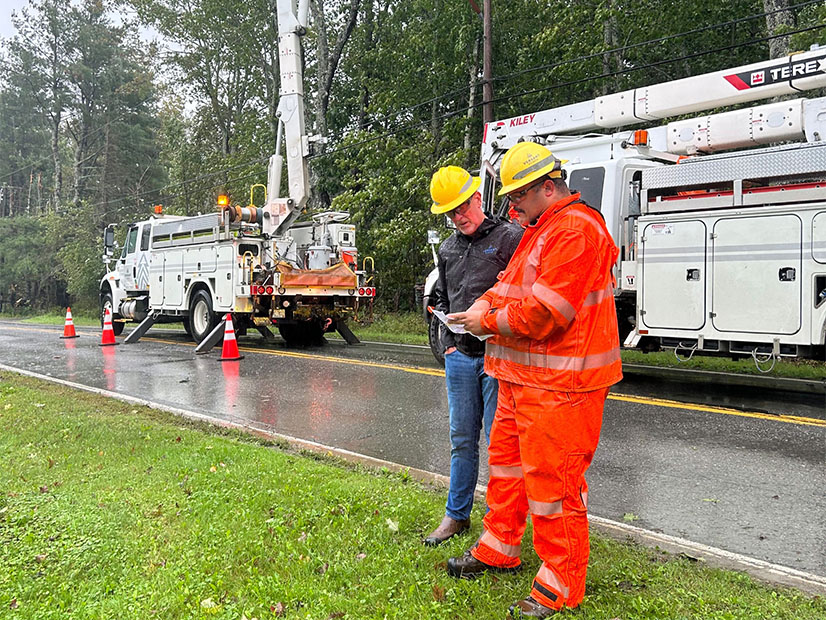
Maine voters have decisively rejected a proposal for a public takeover of the state’s for-profit electric transmission and distribution infrastructure.
The unofficial tally in the Nov. 7 referendum was approximately 70% opposed and 30% in favor with 99% of the vote tallied, multiple media reports indicated. The state had not posted official results by the close of business Nov. 8.
The proposed Pine Tree Power Co. would have been a nonprofit, consumer-owned utility focused on reliable, affordable service rather than shareholder profit.
Other mission goals included assisting the state with its climate action plan, improving internet connectivity, advancing environmental and social justice, creating transparent governance and supporting economic growth.
Another question on the referendum ballot Nov. 7 would have affected Pine Tree: A proposed requirement that any consumer-owned electric utility gain statewide voter approval to exceed $1 billion in total outstanding debt.
Voters approved that measure by a margin nearly as wide as their rejection of Pine Tree — 65% to 30% — according to unofficial results.
Rural electrification cooperatives, municipal electric districts and certain quasi-independent state entities also are subject to voter approval of debt exceeding $1 billion, under terms of the referendum.
Long-running Debate
The concept of a Maine public utility has existed for years, rooted in part in the low customer service and reliability ratings of Central Maine Power and Versant, Maine’s two investor-owned electric utilities. (For NetZero Insider’s in-depth pre-election look at the issues, see “In the Fight Over Maine’s Utilities, the Future of the State’s Energy Transition Goes to Voters.”)
But following through and creating Pine Tree has proved difficult.
In 2021, Gov. Janet Mills (D) vetoed legislation that would have directed a public takeover. Seven weeks before the 2023 referendum, she urged state residents to vote “no,” saying a takeover would result in years of litigation and create paralysis amid the urgent need to prepare the grid for the clean energy transition.
Also, she said, Pine Tree would debut with up to $13.5 billion in debt amid potentially high interest rates.
The parent companies of CMP and Versant spent heavily to sway public opinion against Pine Tree.
Arguing in favor of Pine Tree was an array of grassroots organizations focusing not just on high rates and poor performance under the current ownership but on the chance to address environmental and social concerns through public ownership.
Late Nov. 7, the group Pine Tree Power conceded defeat on the ballot measure, but not on the underlying issues. It said:
“Central Maine Power and Versant’s parent companies poured almost $40 million … into misleading voters rather than fixing their worst-in-the-nation service. They made clear that their priority will always be enriching their shareholders, not serving their customers. Thousands of Mainers are ready for public power. While we couldn’t overcome being outspent 37:1, we started a critically important conversation that does not end today. Our grassroots movement educated thousands about the savings, reliability and climate benefits of consumer-owned utilities.”
Before the election, Pine Tree proponents said utility takeovers often take more than one attempt to achieve and said they would continue to press the issue in Maine if voters did not approve it this time.
Yet another of the eight questions on Tuesday’s ballot will have direct bearing on any future effort. By a huge ratio — 86% to 14% by unofficial tally — voters approved a ban on foreign governments and their entities spending money to influence elections or referendums in Maine.
Versant is owned by Enmax, a private corporation whose sole shareholder is the city of Calgary, Alberta. CMP is part of Avangrid, which is part of Spanish utility Iberdrola. “Maine not Spain” has been a recurring slogan in debate over Pine Tree, but the largest shareholder of Iberdrola is not Spain — it is Qatar, through its sovereign wealth fund.
Proposed Structure
Under the wording of the referendum, seven of Pine Tree’s 13 board members would have been elected and six would have been designated experts.
Starting Jan. 1, 2025, the state Public Utilities Commission would have directed takeover of any utility that met the criteria laid out by the referendum.
Upon takeover, Pine Tree Power would have had to retain the utility’s employees and would have been liable for property taxes on its infrastructure. It would have been exempt from state income tax, however, and its debt also would have been exempt from state taxes.
The new company would have had to cover all of its expenses with rates and charges — it would not have had access state funds and its debt would not have been a state liability.
In her Sept. 20 message urging residents to vote down the takeover proposal, Mills said she is committed to improving utilities’ quality of service and holding them accountable for it. But she challenged Pine Tree as a means of accomplishing this and pointed to its proposed structure.
“Question 3 creates a governing board of elected individuals — in other words, politicians — with no particular credentials,” Mills said. “Electing people only injects a level of politics and partisanship into the delivery of our electricity. That’s the last thing we need, and, hey, I’m talking as a politician.
“And what would this governing board of politicians be in charge of? Well, they would be required to contract with an operator to run the transmission and utility’s assets. An operator that has ‘familiarity with the systems to be administered.’ So, somebody who looks a lot like CMP and Versant. So, what we are really talking about here is adding a layer of bureaucracy and politics and partisanship over the existing structure of CMP and Versant and I just don’t see how this improves anything.”

